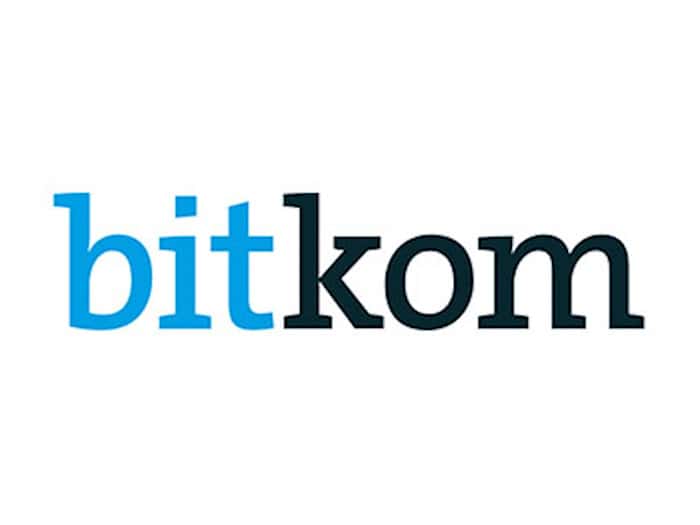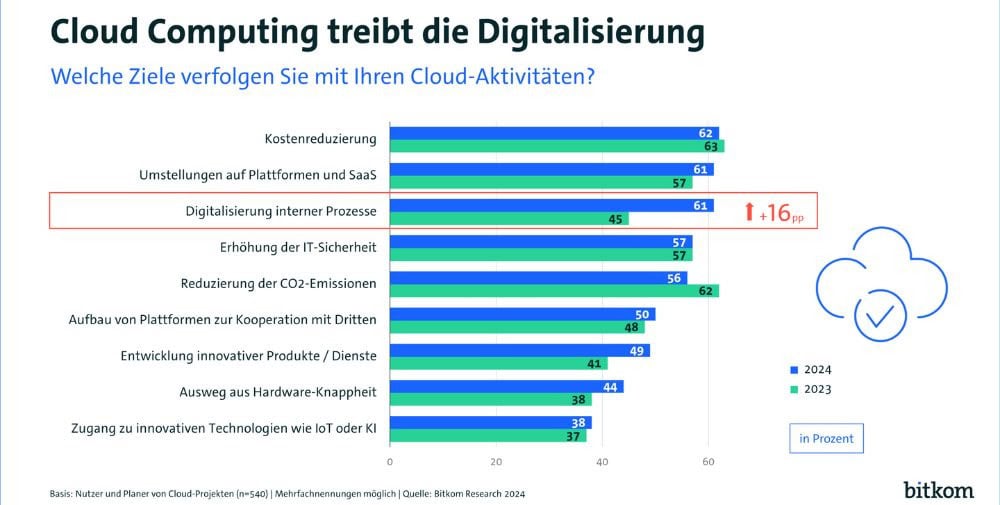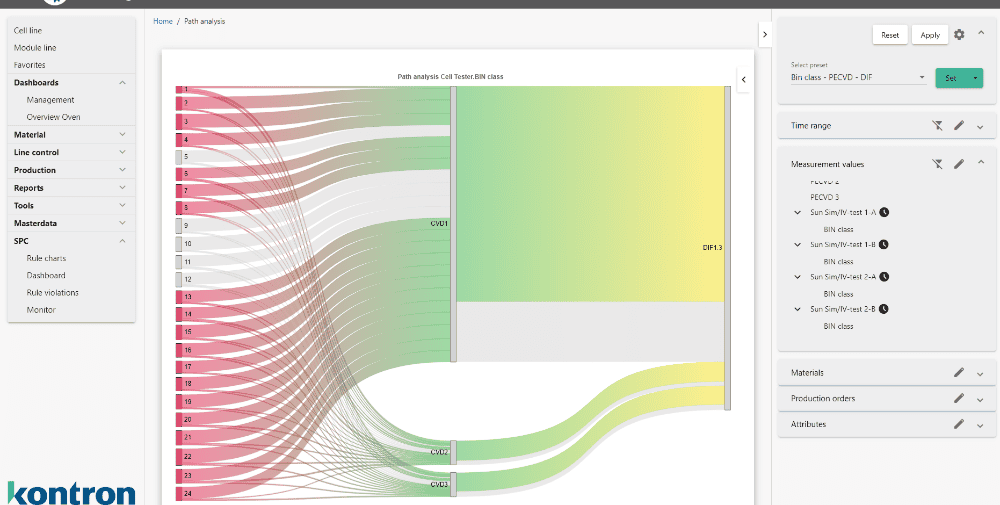
The data is based on a representative survey of 603 companies with 20 or more employees from all sectors of the economy. “The cloud is also a basic technology of the digital economy in Germany. Cloud applications enable even small companies to fully digitalize their processes and business models,” says Bitkom President Dr Ralf Wintergerst. “The cloud will dominate corporate IT in the future.”
Other goals for cloud use currently include reducing costs (62%), increasing IT security (57%), reducing CO2 emissions (56%), building platforms for cooperation with third parties (50%) and developing innovative products and services (49%). 44% see the cloud as a way out of the hardware shortage for operating their own servers, while 38% see it as providing access to innovative technologies such as the Internet of Things and artificial intelligence.
When it comes to sustainability, companies see both advantages and disadvantages to the cloud. Six out of ten companies state that cloud computing can save energy and resources (61 percent) and that sustainability reports can be created more easily (59 percent). At the same time, three quarters (75 percent) believe that cloud computing’s easy scalability means that software is becoming increasingly resource-hungry. And 54% consider the energy and resource consumption of the cloud to be too opaque. “Companies can become more sustainable with cloud computing. However, this is not a sure-fire success, but requires targeted measures. Even in the cloud, we need to keep an eye on resource consumption,” says Wintergerst.
Demand for AI applications from the cloud is set to double in five years
Companies in Germany are currently using a wide range of different applications from the cloud. Email (67%), applications for HR management, accounting and financial planning (67%), storage space for files (66%) and office software (64%) are in the lead with around two thirds each. 58% use the computing power of the cloud in parallel for a wide range of applications, 56% have databases in the cloud. This is followed by web conferencing (49%), collaboration tools (48%), security software (48%), ERP (36%), IoT services (34%), CRM (32%) and software development (30%). 17% of companies are already using the cloud for AI applications.
When companies are asked what could be of interest to them in the next five years, there is a whole range of applications with great growth potential. For example, 80% want to use email from the cloud (up 13 percentage points), 74% storage space (up 8 percentage points) and 73% office software (up 9 percentage points). Web conferencing (60%, up 11 percentage points) and software development (41%, up 11 percentage points) are also expected to see strong growth. In addition to CRM applications (48%, up 16 percentage points) security solutions (64%, up 16 percentage points) are at the forefront of growth. Artificial intelligence is at the forefront. The number of companies that want to obtain AI from the cloud is expected to double from the current 17% to 34%. “IT security and artificial intelligence will give cloud computing a strong boost and at the same time the cloud promotes the use of AI and strengthens security,” says Wintergerst.
AI from the cloud: greatest interest in forecasts and data analysis
When it comes to AI services from the cloud, the companies that already use them or want to do so are primarily interested in forecasts and predictions (87%) and data analysis (81%). Two thirds (67%) want to use AI-based security solutions and fraud detection, followed by the automation of business processes (52%), the analysis and generation of texts (50%), voice or audio (46%) and images or videos (43%). AI-supported software development is of interest to 42%, chatbots to 37% and personnel selection and recruiting to 31%. A quarter (24%) are interested in facial recognition and 12% in emotion recognition. “The cloud also offers smaller companies very easy access to various types of artificial intelligence,” says Wintergerst.
Despite the great interest, many companies still find AI applications from the cloud too expensive (75%), they are considered a security risk (64%) or are not compatible with data protection (62%). 59% are currently unable to use them due to a lack of expertise within the company. At the same time, however, 56% say that the cloud provides access to the latest AI technologies, 36% that AI applications in the cloud are easy to use and 28% attest to a transparent pricing model.
4 out of 10 cloud users rely on “cloud only” or “cloud first”
Every seventh company (14%) that uses the cloud pursues a “cloud only” strategy. This means that cloud computing is used for all applications and systems and existing solutions are transferred to the cloud. A further 26 percent rely on “cloud first”. Cloud solutions are preferred for new projects and existing applications are moved to the cloud as required. 39% have a “cloud too” strategy, i.e. they supplement existing IT solutions with cloud applications. 18 percent do not follow a defined cloud strategy. “4 out of 10 companies that already use cloud computing today give the cloud a clear priority in their IT strategy. Software providers must develop suitable offerings for this”, says Wintergerst.
In addition, 25% of cloud users rely on a hybrid cloud, i.e. a mixture of public and private cloud services. A further 18 percent are planning to use it and 10 percent are discussing it. And as many as 38% use a multi-cloud, i.e. they use cloud services from different providers. A further 11% are planning to switch to a multi-cloud, and 11% are also discussing it. From the users’ perspective, the main advantages of the multi-cloud are the avoidance of outages (100 percent), better distribution of resources at full capacity (96 percent) and the reduction of lock-in effects (76 percent) and increased freedom of action (62 percent). 57 percent want to use special services from specific providers, while 51 percent cite economic reasons such as cost reduction.
More than half want to invest in the cloud
This year, 54 percent of all companies in Germany want to invest in the cloud. A third of them (33 percent) plan to increase their spending compared to the previous year, while only 21 percent intend to reduce it. 42 percent are keeping investments stable. As many as 77% are planning to invest in the cloud in the future. Wintergerst: “The cloud is an essential part of corporate IT in many places. Investments in the cloud are investments in the digital future viability of your own company.”
When selecting their cloud provider, companies particularly value trust in IT security, data protection and compliance (99%), the performance and stability of the offering (97%) and the ability to encrypt data (93%). Other important criteria are sustainability (61%), interoperability (60%), data centers in Germany or the EU (59%) and a trustworthy country of origin of the provider (58%). For half (50 percent), innovative strength such as access to the latest solution is decisive, 46 percent pay attention to openness, for example through open source, 41 percent to low costs, 30 percent to compliance with Gaia-X and 28 percent to global availability of the offering.
Cloud location Germany is at the top
Germany is at the top of the list for companies that pay attention to the location of cloud data centers: 99 percent would prefer domestic data centers, and 1 percent would at least consider them. Locations in the rest of the EU would be preferred by 60 percent, with 37 percent considering them. This is followed by the USA (11 percent would prefer it, 34 percent would consider it), the rest of Europe (8 percent and 24 percent respectively), Japan (8 percent and 16 percent respectively) and India (5 percent and 15 percent respectively). Only 3% would prefer the UK, but 49% would at least consider data centers there. Bringing up the rear are China, which only 1 percent would prefer and 3 percent would accept, and Russia, which virtually no company (0 percent) would even consider.
Sovereign cloud offerings are becoming increasingly relevant on the market for highly regulated applications, such as in the financial or healthcare sectors or for public administration. They promise data protection and data sovereignty at the highest level. However, only 4 percent of those responsible in companies can currently explain what this is about, while 31 percent know at least roughly what it is. 21% have already heard of it, but cannot explain what it means, and 41% are completely unaware of sovereign cloud offerings. “Providers of sovereign cloud offerings still have a lot of work to do to raise awareness if they want to establish themselves on the market,” says Wintergerst. “The potential for sovereign clouds is definitely huge.”
Cloud obstacles: Lack of skilled staff, lack of time, high costs
The biggest obstacles to implementing cloud projects and moving to the cloud are a lack of qualified staff (76 percent), concerns about unauthorized access to sensitive data (64 percent), lack of time (63 percent) and excessive investment requirements (62 percent). Other internal company hurdles include an overly complex migration to the cloud (55%), a lack of qualified external advice (53%), fear of data loss (52%) and resistance within the company itself (43%). For example, 55 percent complain that IT security requirements are too high, 51 percent complain that data protection requirements are too high and 50 percent generally feel that regulatory requirements are hindering cloud projects.
– – – – – –
Further links
👉 www.bitkom.org
Graphic: Bitkom




